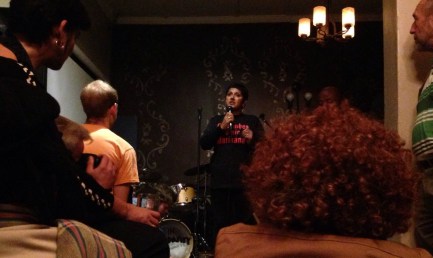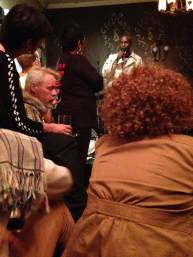Marikana Massacre: Supporting the Strike
At breakfast, Meghan and I met Ingrid, a young Norwegian woman who is volunteering in Capetown with an organization that seeks to empower farmers, the TCOE. Ingrid told us of the initiatives undertaken by her colleagues such as encouraging individual farmers to grow their own food in an effort to be less dependent on the corporate landowners. Through their efforts, a woman has started a nursery of her own and grows a number of plants for herself and the community. The project has helped empower not only farmers, but women, a majorly marginalized group in such rural settings. Ingrid told us of a benefit program that was scheduled for the afternoon to raise funds for the striking farmers of Marikana.
The miners are striking in protest of the Marikana massacre, an incident that represents the most lethal use of force by South African police following apartheid era violence of the 1950s. Police opened fire on protesting miners, killing 34 of them and injuring countless others. Miners (most of them working in the Lomin platinum mines) had been striking to demand a fairer working wage.

Before the massacre, 10 people, including four policemen or security guards, had already been killed. Numerous miners were arrested and allegedly tortured by police following the incident, and there have been more deaths subsequent to the August 16, 2012 massacre. The events are synonymous to apartheid-era protests and harsh government crackdowns.
The ongoing strike, led by the country’s main mineworker union, AMCU, has now become South Africa’s longest and costliest strike. It formally began in January as 80,000 workers refused to work until their demands for R12,500 ($1,196) is met. Their demand is over double their current salary, but as platinum production in South Africa accounts for 40 percent of the global market, the stakes are high. For the workers and their families, however, the cost of striking are hitting hard.
Thousands of striking miners gone without a salary for the five month-long strike, and their families are suffering. The fundraiser Ingrid told us about was an effort to help these families whose breadwinners are on the frontlines demanding justice for the killed miners and higher wages. We were thrilled to learn more about the situation and to hear miners themselves speak at the event. Although the miners skirted around some of the important questions, it was a privilege to hear them speak and to be able to support their efforts. 
Here is an informative, in-depth piece by The Guardian on the Marikana Massacre and its aftermath: http://marikana.mg.co.za/#intro